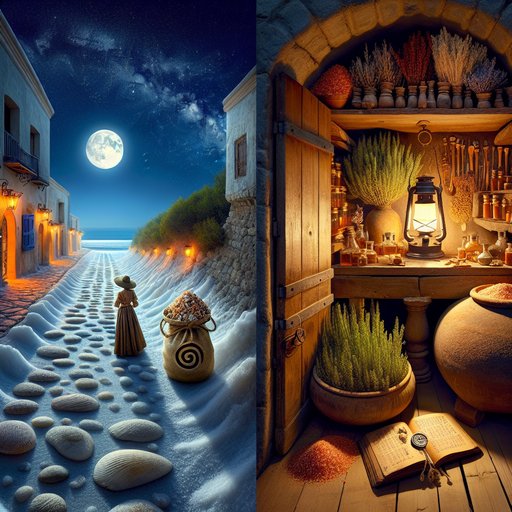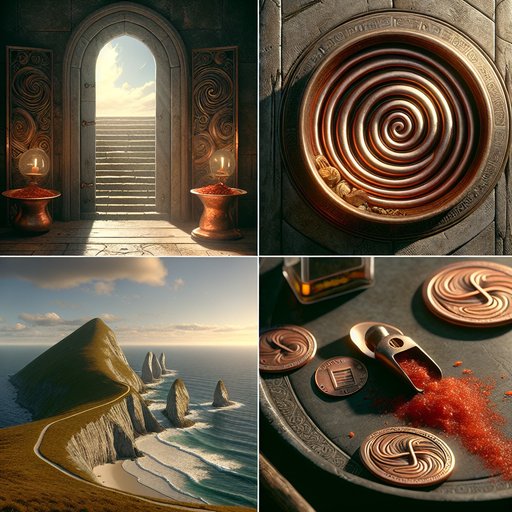CHAPTER 5 - The Night of Resin and Echoes

Barbra Dender, sleepless in her rented room above the perfumer’s shop in Hadibo, is drawn onward by the mystery of the copper token marked with a spiral and three bars. After three soft knocks and a whispered use of her name, she opens her door to Amina, the perfumer’s usually reticent wife, and a small, mute boy named Samir. From this unexpected quarter comes help: Amina reveals the sea cave cache was a test, and that some in the family now trust Barbra’s integrity. Using brine and dragon’s blood resin, Amina shows Barbra how to make the token sing and reveal hidden marks, and the three set out at night along a “salt road” guided by tone and moonlit crust. They map sound across salt pans and cairns to reach a crumbling cistern that conceals a passage. Inside a hidden chamber lined with shells etched in spirals, Barbra finds ledgers stained with resin that match the scrap she first found. But rivals arrive—one of them the singer from the harbor she had briefly noticed—and the tide begins to surge into the passage. With water rising and voices closing in, Amina urges Barbra to take the chest through a submerged exit as a deeper voice from beyond the dark calls her name, leaving Barbra to choose between escape and protecting her new allies.
She was still rubbing resin dust from the windowsill when she heard three soft knocks, spaced like the token’s bars, and then her name breathed through the wood: “Barbra.” Her freckles prickled the way they did in bright cold, though the room was warm and laced with citrus and sap; she had always disliked those freckles for the way they announced her, but Socotra had taught her that even flaws could be navigational. She slipped her feet back into her blue and white Asics and shrugged on a black leather motorcycle jacket, a heavier skin against the night. The floorboards creaked under her as she crossed to the door, slim legs steady from long walks, palm hovering before she turned the handle to the unknown below the perfumer’s eaves. Amina stood there in the lantern’s low oval, hair wrapped, eyes reflecting tiny flames, the same woman who had watched Barbra buy resin without a word.
Beside her, a boy of nine or ten, slight as a reed, lifted a conch shell to his ear and lowered it again, attentive, as if listening to the room breathe; Amina murmured, “This is Samir,” touching his shoulder. Barbra caught a ghost of the perfumer’s scent on them—citrus peel and old copper—and felt the stubborn knot of frustration in her chest loosen by a notch. “You came,” she said, because it was the only thing left after days of guarded looks and decoys, and the woman nodded once, as if acknowledging both a risk taken and a debt owed. “We sent you to the sea cave to see how you would break when the trail lied,” Amina said, moving past Barbra into the room with the quiet familiarity of someone who had watched her pass on the stairs for a week.
“Some of us believed you would pry, then leave; some of us hoped you would listen to what isn’t said.” The boy’s fingers dipped into the small brass bowl Amina had brought, water shining with a film of brine, and he scattered droplets across the copper token on Barbra’s table. When the dragon’s blood resin met salt and metal, it bled a deeper red, and a faint crosshatching rose under the spiral and bars like veins surfacing. Barbra felt her shoulders pull together in a shiver that wasn’t cold. She hardly wore makeup and needed none, but the sight made her want to hide and grin at once—something intimate had revealed itself because she had been patient.
Samir set the conch’s rim to the token and tapped its belly with a shell, coaxing a tone that thrummed in Barbra’s wrist bones where she steadied the table; the pitch rose when he wetted the edge with brine, then fell when he bent the resin’s sheen with his fingertip. Amina’s eyes never left Barbra’s face as if to measure whether the foreigner would impose a story or let the island speak in its own tempo. “The salt road isn’t a road,” Amina said simply. “It’s a ladder of notes across places where wind, stone, and brine agree to sing together.
The three bars are steps, yes, but not only in the cave—it’s outside too, when the air cools and the tide draws breath.” Barbra glanced at the token, remembering the singing cleft in the wadi and the staged cache by the roaring sea; suddenly the decoy wasn’t cruel, it was precise, a way to filter those who only saw maps from those who sensed measures. They climbed to the roof, and Yafai geckos scattered in pale sprints along the parapet. Hadibo lay like a dotted necklace below, generator hum threading between low houses, the harbor a darker band beyond. Barbra cradled the token, feeling its slight warmth from the lamp, and held it up; Samir raised the conch, and Amina showed Barbra how to pivot until the bars matched three faint stars shallow above the horizon and the glow of the far radio mast—the first rung of the ladder.
When the conch’s tone leaned into the angle, they all felt it, a subtle tug like a tide in the chest, and Amina smiled for the first time. They moved quietly into the street, the boy’s bare feet whispering on dust, Barbra’s Asics making a soft, rubber beat. She always gravitated to unusual alleys, to places tourists rarely saw, and this one threaded behind the perfumer’s shop, past bundles of reed and a stack of copper bowls catching star-crumbs; she thought briefly of the glass-fronted cabinet at home where, if she managed this with care, the token might one day rest between a carved whistle from the Andes and a shard of blue tile from a Moroccan hammam. The salt wind lifted a loose strand of her red hair to her lips, and she tasted it like a promise, the island’s ancient trade in her mouth.
Despite herself, she thought of the singer’s low voice at the harbor, the way it had brushed a shape around her heart for an hour and left as quickly—another path she didn’t have time to follow. At the salt pans east of town, moonlight turned the world into poured tin. Amina kneaded a pinch of resin dust between her fingers and let it fall onto a thin crust where brine had receded, and the edges took on a dull glow, not truly seen but felt, like the difference between a whisper and a murmur. Samir stood with the conch half raised, eyes narrowed, waiting; Barbra brought the token to the level of her collarbone and angled it until the hum in the metal and the hush of the wind locked.
The “road” presented itself as a chain of spots where that lock clicked, and they crossed the pans stepping from one cool place of sound to the next, as if the island had placed stones in the air for them alone. They reached a cairn no taller than Barbra’s hip, its stones laced with salt crystals and ribbons of spider-silk, and there, tucked in its leeward pocket, lay a shallow copper bowl like those in the perfumer’s secret room. Amina tilted it, and a few grains of dried resin slid toward the curve; Samir tapped it three times with his shell and drew a chord that made the morning-warmed rocks answer from the dark ridge inland. “The cave that sings without a mouth,” Amina said, listening, and Barbra felt a pressure behind her ears like descent in an airplane—there was a cavity somewhere ahead.
Her calves were already tightening from the long stride across crinkled salt, but heat lit a path down her spine as they angled toward shadow, and she urged them on. What had been a wadi by day became a throat by night. The breeze stumbled in and came back tuned, and the first time Barbra pressed the token to a fissure in the limestone, it came alive under her palm with a low, woolly note and a tickle that ran up to her elbow. They stood at the mouth of a collapsed cistern, blocks green with algae around its rim, a remnant of the old water work that had once made gardens here where now goats grazed scarce leaves.
Amina’s hand rested on the stone as tenderly as on a child’s hair. “My grandmother carried salt on her head to caravans that met here,” she said. “Some of the family kept ledgers; some kept silence; a few kept both.”
They lowered into the cistern one by one, Barbra testing each toehold, the leather of her jacket rasping stone, Samir as sure as a gecko. It narrowed, then widened into cool, echoed night, the floor damp with centuries of seep and a tang that lifted the back of Barbra’s tongue.
A slit, invisible at first glance, took shape when Samir’s conch droned; Amina guided Barbra’s hand to a notch beside it, and she slid the token in, notched edge to notched stone. The humming built as if the earth drew breath, and the slit gave, a door of pebbled limestone swinging inward on a pivot older than any ledger. The chamber beyond was unexpected in its intimacy. Shelves carved into the rock held shells etched with spirals and bars, their mouths sealed with resin to keep out salt damp; a shallow basin lay at the center, the chalk of salt crusting its lip.
On a low pedestal sat a resin-sealed chest banded in corroded copper, its lid embossed with the spiral not as ornament but as instruction—turn with care, lift at the last. Barbra glanced at Amina, who nodded, and together they eased it open; the scent that rose was old resin and vellum and a clean salt that made Barbra think of pages laid out to dry on a beach long ago. She lifted a ledger and traced the handwriting. The strokes matched the angled script on her scrap of red-stained paper, and there in the margin, three tiny scored cuts echoed the token’s bars—a consistent hand had tended this secret for decades.
Samir smiled without sound when Barbra mirrored the spiral with the token and a thread of tone trembled in the air; for a breath, everything aligned: effort, patience, and the island’s guarded heart. It was then that a glow wavered against the ceiling stones and shoes scraped on the cistern rim above—a light too white to be moon and a sound too harsh to be family. A figure leaned into the opening, lantern swinging, face cut by shadow. Barbra knew the silhouette before he spoke—the singer from the harbor music night, the one whose song had threaded her pulse and then vanished like spray in wind.
He was flanked by two men in scarves dusted with salt, and his gaze went first to the token in her hand, then to the open chest, then to Amina, as if weighing an old quarrel. “We said the decoy would be enough,” he said softly, and to Barbra added, with a warmth she mistrusted all the more for its familiarity, “You were supposed to stop at the song.”
Amina stepped between them, shoulders straight, and Samir’s small hand tightened on Barbra’s wrist in a warning that didn’t need a voice. Somewhere deeper in the rock, water shifted, a throat clearing for a flood; the tide must have turned, and the cistern remembered its oldest purpose. “Take the ledgers,” Amina whispered without turning her head.
“There’s a low tunnel to the shore—you’ll feel it with the token—go before they block the way.”
Barbra’s heart kicked against her ribs as the first cold edge of water licked her shoes. She slid the top ledger into her jacket against her body, the chill shocking through leather, and gathered the token in her palm until its spiral seemed to warm. The singer descended a step, eyes level with hers; behind him, the lantern light jittered, making the chamber walls breathe. Then, from the tunnel behind her, beyond the dark water, a voice rose out of the hum—an older timbre that shivered her like a chord: “Barbra.” She froze on the hinge of decision—run with the secret or stand and face an old name spoken in a place no one should know—is there time to choose before the water makes the choice for her?


































































